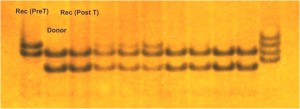Donor Chimerism Study
The outcome of a stem cell transplant can be complete donor chimerism (100% donor cells) or mixed donor chimerism of varying proportions of donor and recipient cells. Another type of chimerism called split chimerism may also exist in which one or more whole lineage is of recipient and the other of donor in origin.
The haematopoietic cells of donor origin can be detected in the host. The test may be done on peripheral blood, bone marrow or lineage specific cells e.g. T cells, B cells and granulocytes. Peripheral blood is equally sensitive in detection of chimerism than bone marrow. Donor chimerism is usually tested by cytogenetics/FISH, real time PCR or STR analysis. The study of donor chimerism may be done to know:
- Whether the donor engraftment has occurred or not?
- Whether there is mixed chimerism? If present then how much?
- If there is mixed chimerism then which lineages are mixed and which are fully donor?
- Whether there is chimerism in the lymphoid and the myeloid compartments?
GRC offers high quality testing for donor chimerism. We use a variety of Short Tandem Repeats (STR) and high resolution PAGE. The results rae usually available in 3-4 days or even earlier in urgent cases.
What samples and precautions are required?
- Recipient’s pre-transplant blood sample in EDTA. If this is not available recipient’s buccal mucosal cells on a stick swab, skin biopsy or hair roots may be collected to represent the pre-transplant status. Care should be taken to avoid contamination of the swab with recipient’s blood.
- Donor blood in EDTA.
- Recipient’s post transplant blood or bone marrow sample in EDTA.
How sensitive is the test?
The PAGE gels are read by densoitometry of the silver stained gels. The results are expressed as percentage with a +10% coefficient of variation. At GRC we always report the chimerism results after comparing it with the previous results when available. This usually allows answering the critical question of whether the transplant outcome is getting relatively better or worst.

